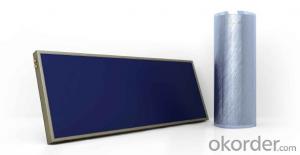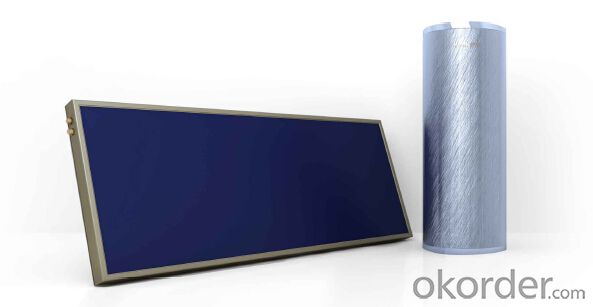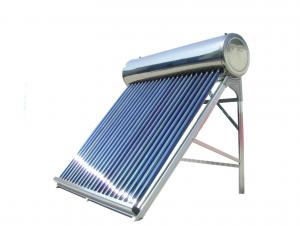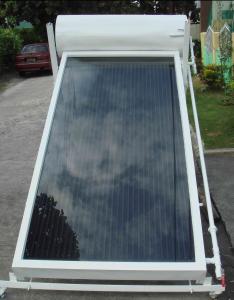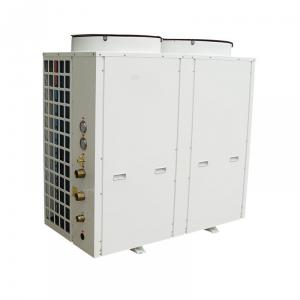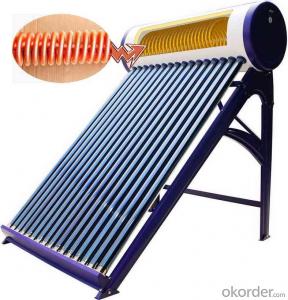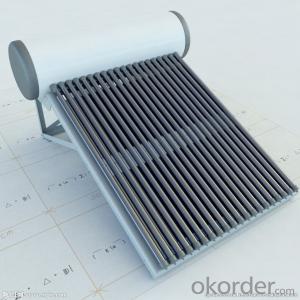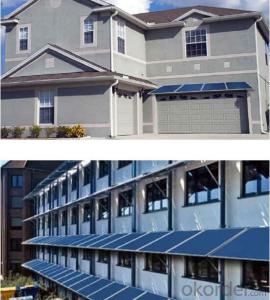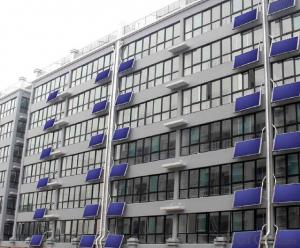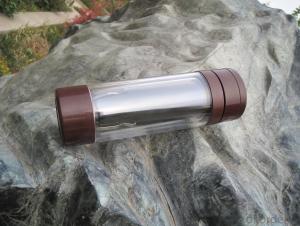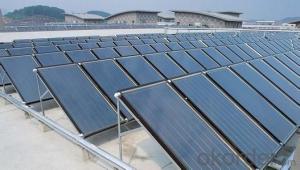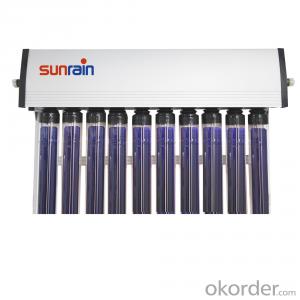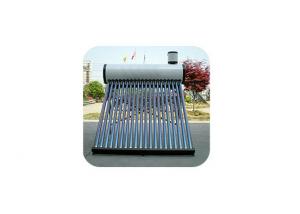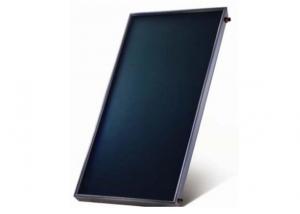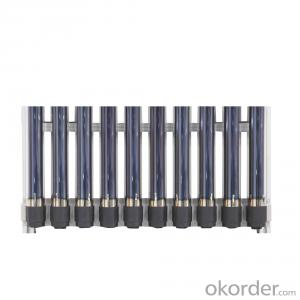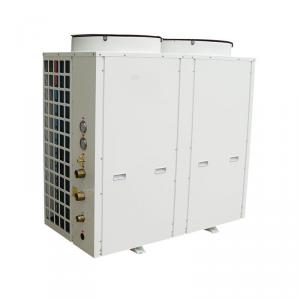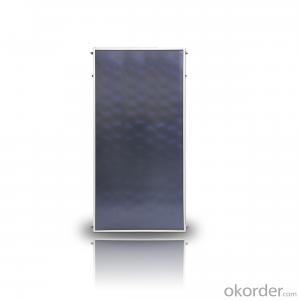Luxury Balcony Hung Solar Water Heating System with Controller
- Loading Port:
- Tianjin
- Payment Terms:
- TT OR LC
- Min Order Qty:
- 1 set
- Supply Capability:
- 10 set/month
OKorder Service Pledge
OKorder Financial Service
You Might Also Like
1.Structure of Balcony Hung Solar Water Heating System(Luxury)
Solar water heating system is the most widely used product with regard to the solar energy application in daily life. Our Balcony Hung Solar Water Heating System(Luxury) is updated compared to the Standard version. It comes with grand flat plate solar collector, and with multiple modularized insulation technology, it will bring to the users better experience. This product is ideal for home as well as for hotel and restaurant.
2. Main Features of Balcony Hung Solar Water Heating System(Luxury)
Grad flat plate solar collector: high price/ performance ratio;
seamless integration with modern architecture;
intellectual control to match human centered concept.
large water tank to stock more water and advanced technology to ensure consistent water flow.
3. Balcony Hung Solar Water Heating System(Luxury) Images
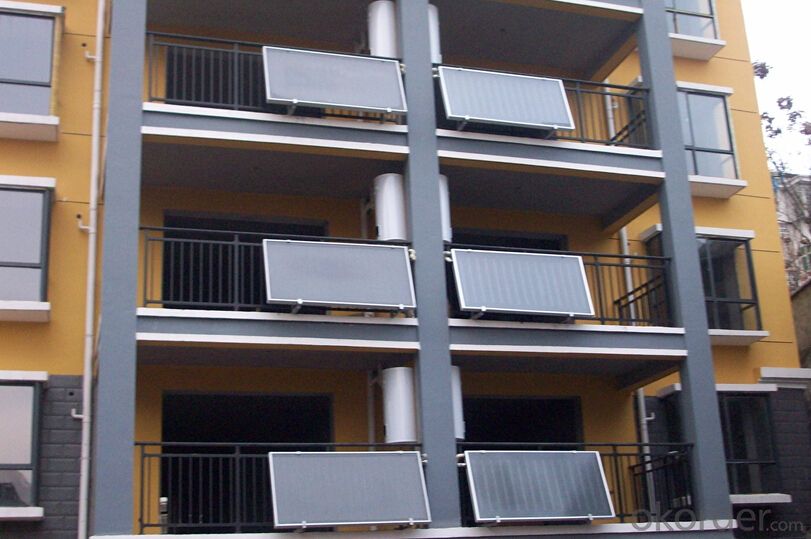
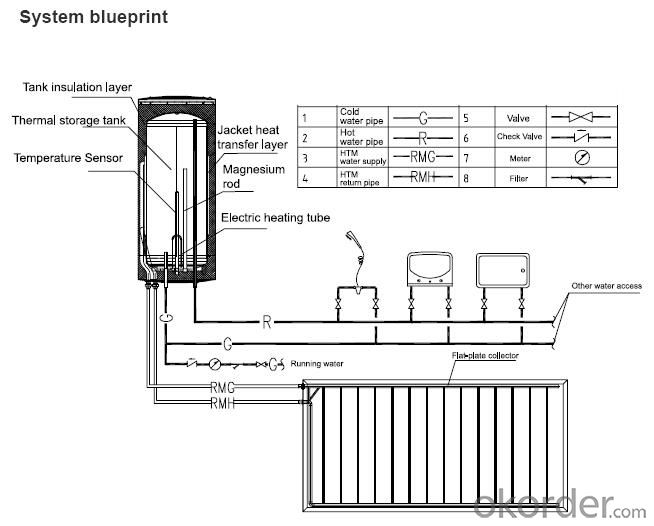
4. Balcony Hung Solar Water Heating System(Luxury) Specification
| Model | Volume (L) | Tank Dimension (mm) | Solar Collector Model | Collecting Area (m2) | Balcony Width(m) |
| PJF-2-80-3 | 80 | Φ480×860 | P-G/0.6-L/L7-1.8-303 | 2 | ≥2.5 |
| PJF-2-100-3 | 100 | Φ480×1030 | P-G/0.6-L/L7-1.8-303 | 2 | ≥2.5 |
5. FAQ
1. Q: Do you have certificate for the products?
Re : Thank you for your attention to our products, and we have product certificate as follows:

2. Q: Can the products be modified?
Re:Yes, the products can be modified according to specific requirement. We'd like to advise you futhur communication in details with us.
- Q: Do solar water heaters require maintenance?
- Yes, solar water heaters do require maintenance. Regular maintenance such as cleaning the solar panels, checking for leaks, and ensuring proper insulation is necessary to ensure efficient operation and prolong the lifespan of the system.
- Q: How does the size of a solar water heater affect its performance?
- The size of a solar water heater directly affects its performance. A larger solar water heater can collect and store more solar energy, resulting in a higher volume of hot water production. It can also provide hot water for longer periods of time, especially during periods of low sunlight or high demand. Conversely, a smaller solar water heater may have limited storage capacity and may struggle to meet the hot water requirements of a household.
- Q: Can a solar water heater be used in areas with high levels of dust or sand?
- Yes, a solar water heater can be used in areas with high levels of dust or sand. However, regular maintenance and cleaning may be required to ensure optimal performance and prevent any obstruction or damage to the system.
- Q: How does the angle and orientation of solar panels affect the performance of a solar water heater?
- The angle and orientation of solar panels significantly affect the performance of a solar water heater. The ideal angle for solar panels is determined by the latitude of the location, as it allows for maximum exposure to the sun's rays throughout the day. A steeper angle in winter and a shallower angle in summer optimize the energy absorption. Additionally, the orientation of the solar panels should be south-facing in the northern hemisphere and north-facing in the southern hemisphere to receive the most sunlight. Proper alignment ensures that the solar panels capture the maximum amount of solar energy, enhancing the efficiency and performance of the solar water heater.
- Q: Can a solar water heater be used in areas with high seismic activity?
- Yes, a solar water heater can be used in areas with high seismic activity. However, it is essential to ensure that the system is appropriately designed and installed to withstand potential seismic events. Reinforced mounting structures and anchoring systems can be employed to enhance the stability and durability of the solar water heater in seismic-prone areas. Regular maintenance and inspection of the system are also crucial to ensure its continued functionality and safety in such areas.
- Q: What is the quality standard for solar water heaters, to the vast number of consumers a clear standard for reference
- 3 bracket. Support must be able to withstand all kinds of corrosion, or have 3-5 years after stent decay, collapse, the solar energy would be ruined, do not buy that support the paint on the brush, brush to paint on the easy detachment, scaffold exposed part is easy to rot, is not to buy stainless steel bracket. Stainless steel is not easy to rust, but the stainless steel material is soft, the bearing capacity is weak.4 liner, at present, most of the solar water heater manufacturers are said to be stainless steel water tank liner. Stainless steel, but chromium and nickel in stainless steel are very different. Good solar water heater uses stainless steel high chromium nickel, ensure the liner durable, corrosion resistance is strong; the use of low grade stainless steel liner is inferior, basic does not contain nickel, corrosion resistance performance is poor, short service life.
- Q: How does the type of water being heated impact the performance of a solar water heater?
- The type of water being heated can impact the performance of a solar water heater in several ways. Firstly, the hardness of the water can affect the efficiency and lifespan of the solar collector. Hard water contains minerals that can build up and cause scaling on the collector's surface, reducing its ability to absorb and transfer heat. This scaling can also clog the pipes and reduce water flow, further impacting the heater's performance. Secondly, the temperature of the water being heated plays a role. Solar water heaters are designed to work best with moderate temperatures, typically around 120°F (49°C). If the water being heated is already at a high temperature, such as in hot climates or during summer months, the solar heater may not have to work as hard, resulting in increased efficiency. Conversely, in colder climates or during winter months, the solar heater may struggle to reach desired temperatures, leading to decreased performance. Lastly, the purity of the water can affect the performance of a solar water heater. Water with high levels of impurities, such as sediment, minerals, or chemicals, can hinder heat transfer and increase the likelihood of corrosion or damage to the system. Regular maintenance and proper water treatment can help mitigate these issues and ensure optimal performance of the solar water heater.
- Q: Can a solar water heater be used in areas with strict building codes?
- Yes, a solar water heater can be used in areas with strict building codes. However, it is important to ensure that the solar water heater system complies with all the applicable building code requirements and regulations. This may include obtaining permits, adhering to specific installation guidelines, and meeting safety standards. Consulting with local authorities or a professional installer specializing in solar water heaters can help navigate any building code restrictions and ensure compliance.
- Q: How does a solar water heater affect water heater efficiency?
- A solar water heater can significantly improve water heater efficiency. Unlike traditional water heaters that rely on electricity or gas to heat water, solar water heaters use energy from the sun to heat the water. This reliance on renewable energy reduces the amount of electricity or gas needed to heat the water, resulting in lower energy consumption and cost savings. Solar water heaters consist of solar collectors that absorb sunlight and convert it into heat energy. This heat is then transferred to the water stored in a tank, raising its temperature. By harnessing the power of the sun, solar water heaters can provide a consistent and reliable source of hot water without relying solely on non-renewable energy sources. The impact of a solar water heater on water heater efficiency is twofold. Firstly, it reduces the amount of electricity or gas consumed, leading to lower energy bills and reduced environmental impact. Secondly, solar water heaters are designed to efficiently capture and transfer heat energy from the sun to the water, maximizing the efficiency of the heating process. Solar water heaters are also equipped with insulation and heat retention features that help to minimize heat loss. This ensures that the heated water remains hot for longer periods, reducing the need for constant reheating. The combination of efficient heat transfer and heat retention features further enhances the overall efficiency of the solar water heater. It is important to note that the efficiency of a solar water heater may vary depending on factors such as the climate, available sunlight, and the size and design of the system. However, even in regions with less sunshine, solar water heaters can still provide a substantial amount of hot water and contribute to energy savings. In conclusion, a solar water heater has a positive impact on water heater efficiency by reducing energy consumption and cost, maximizing the utilization of renewable energy, and incorporating features that minimize heat loss. Investing in a solar water heater can significantly improve the overall efficiency of a water heating system while promoting sustainability and reducing environmental impact.
- Q: How does a solar water heater impact the overall energy consumption of a household?
- A solar water heater can significantly reduce the overall energy consumption of a household. By using sunlight to heat water, it reduces the reliance on electricity or gas-powered water heaters, resulting in lower energy bills. This renewable energy source helps to conserve non-renewable resources and decrease greenhouse gas emissions, making it an environmentally friendly choice.
Send your message to us
Luxury Balcony Hung Solar Water Heating System with Controller
- Loading Port:
- Tianjin
- Payment Terms:
- TT OR LC
- Min Order Qty:
- 1 set
- Supply Capability:
- 10 set/month
OKorder Service Pledge
OKorder Financial Service
Similar products
Hot products
Hot Searches
Related keywords
